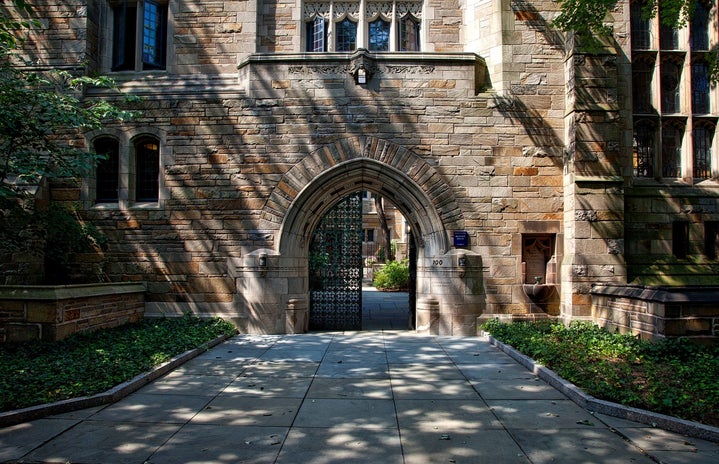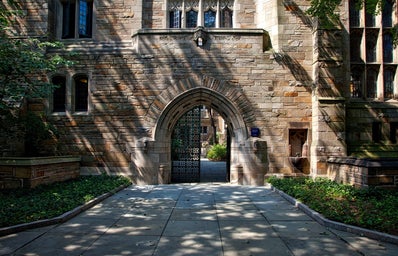Dear first-generation student,
I am writing this to let you know that you are not alone. As a Latino, first-generation student who attends a predominantly white institution with a very small first-generation student population, I understand what it is like to feel like you don’t belong at college, to feel as though you are going to fail, and to wonder if everything that you will go through is even worth it. Attending college is intimidating for the vast majority of first-year students, but I would argue that this intimidation and fear is even worse for first-generation students. We don’t have immediate family members to calm our nerves with the words “it will all be okay,” because they themselves don’t know if this is true. We don’t have parental figures to share their college stories with us, or siblings that will pass down their study tips, or other family members we can send our papers to so they can peer edit them before we submit them for a grade. We build our own journeys from the ground up. None of that was meant to be shady, I promise. If you have those people in your life, of course you should ask them for guidance and help along the way. It is not your fault that you were born into such a situation, but it is good to be aware that those family members are privileges that not all students have access to.
Similarly, I acknowledge that I, too, have privilege over some other first-generation students, in that I was fortunate enough to have access to an abundance of academic support programs which steered me in the right direction during the college admissions process. Even now, I am very fortunate to attend a college that has an entire office dedicated to aiding students like me (The Office of Diversity, Equity, and Inclusion). These programs, however, can only aid so much. A first-generation student can be provided with all of the academic support services in the world but still feel incompetent as a college student. Being a successful student does not solely consist of taking advantage of the support services that are available to you. It also consists of the student believing and feeling as though they have a purpose at their college: a feeling that cannot be taught and a feeling that I am still searching for.
This is my imposter syndrome experience. I want to emphasize that in no way, shape, or form am I arguing that all first-generation students will encounter this challenge during their college experience. I am also not claiming that I am an expert on how to overcome imposter syndrome, because I work every day to combat this feeling. The purpose of this article is to share my experience, in hopes that another first-generation student that may be feeling as though they are the only one facing this challenge can feel comforted, supported, and understood.
Imposter Syndrome:
I have no shame in revealing that I am a student that was waitlisted to Kenyon prior to being admitted. My GPA, extracurriculars, and essays (I felt) were all strong, but what weakened my application was my standardized test scores. My family was not able to afford extensive SAT/ACT tutoring and prep to increase my score, nor did we have $500,000 to pretend that I was a superstar athlete. When I got my scores back, I was devastated. It was then that I realized that, after four years of hard work, it was possible that I would not attend a college/university on my dream list. With the fear that I would not get into any college at all, I applied to nearly 30 schools. After many acceptances from state schools and several rejections and waitlist offers from private schools, I definitely believed that I was not good enough to attend a school like Kenyon. After accepting an offer at another small, private liberal arts college in Illinois, Kenyon called me and offered me a spot in the class of 2021. I. Was. Shook. I flew out to campus and immediately fell in love. Before I knew it, I became a student of the Kenyon Educational Enrichment Program and was on a plane to Gambier to begin this program just two weeks after my graduation. I was so caught up in the excitement of the acceptance that I did not stop to ask myself: am I truly ready for Kenyon?
As a pre-med student (yes, I know that’s annoying) I enrolled in chemistry, biology, chemistry lab, and an English course for both the fall and spring semesters, with the expectation that I would earn a 4.0 at the end of each semester, just like I had in high school. Saying I was wrong is an understatement. I went from being the valedictorian of my high school to being one of the students with the lowest grades on my first chemistry exam. My chemistry test scores did not improve, my biology test scores were mediocre, and I felt as though I never knew what was happening in my chem lab. I did not know what a pipette was, I did not know what a mole was, I did not know why we cared so much about how acids and bases interacted (like, just mix them and see what happens, amirite?). It was a mess. During this time, some of my advisors and peers (both explicitly and implicitly) encouraged me to think about other careers to pursue outside of the field of medicine. Throughout that entire year, I felt alone. I felt like a failure. Here I was, at a college I dreamed of attending, yet I was failing. I felt as though I was failing myself, my family, and my community. When I would call my parents to explain my academic situation, they filled me with words of encouragement, but there was always a lack of empathy in our conversations. This, of course, was not their fault. My father stopped attending school in México after the sixth grade, and my mother barely graduated high school. I just felt alone. It sucked. I felt as though Kenyon should have left me on the waitlist. I felt as though I was taking the spot of a more deserving student. What was I doing here? I should have just gotten on a plane to go home.
There came a point, however, when I realized that a pity party was not going to help me. I reached out to ODEI and I was provided with a chemistry tutor. I started to study with friends in my classes. I started to YouTube study techniques that could work for me. I went to office hours. I took the necessary steps I needed to in order to not fail my courses. If I was going to end with a C-, I wanted to take pride in knowing that that was MY C-. I worked for that C-. In the end, the work did pay off. Am I a chemist? No. Am I a biologist? No. I just did what I had to do to survive the year. I utilized my resources and I tried so, so hard. I had to realize that there is beauty in grades that are not As.
To this day, I have yet to receive an A on a Kenyon exam. Even after hours of studying and sacrificing different aspects of my life, my GPA is not impressive, but I am okay with that. I am okay with not having a 4.0 because I have come to the realization that my grades do not define me. My grades are not reflective of my capability or intelligence, nor are they an indication of whether or not I am failing my community and/or family. At the end of the semester, all I ask of myself is to look at my GPA and know that I did my very best to earn those grades. It doesn’t matter if I got the lowest grade in the class; what matters is that that grade is mine. I refuse to allow myself to let my GPA be a reflection of my enrollment at Kenyon. Instead of thinking, “Kenyon put me on the waitlist for a reason,” I had to change my mentality to “Kenyon put me on the waitlist because they saw potential, but they took me off because they continued to believe in me.” Waitlists exist for a reason. I did not receive a rejection because someone on the admissions committee believed in me. Though at times it feels like they made a mistake, I have to have confidence in the fact that they did not. I have to believe in me. All first-generation students have to believe in themselves. They have to believe that they deserve to be on their campus, no matter how different they may be from their peers. They have to take the challenges that come their way and seek out the resources that are necessary to overcome those challenges. They have to be prepared to feel alone, to feel like their families will never understand. They have to pick themselves up and continue to prove their capabilities to themselves. They have to know that they are valid and capable. They have to acknowledge that they are disadvantaged in comparison to their peers, but it is up to them to decide whether they are going to allow this fact to hinder or to motivate them.
Clearly, these statements are far easier said than done. As I mentioned earlier, I do not feel motivated, capable, and/or understood 100% of the time, but I try my best. I encourage all first-generation students to take the time to reflect on their college experience thus far and take pride in the fact that they are still standing despite the odds being against them. We, as first-generation students, are strong. We are worth the investment. We are capable. We are valid. We do belong. We do have a purpose. We are not imposters. Will it take time to realize and internalize these feelings? Yes. But once we do, we will be unstoppable. If there is a first-generation student out there who needs a peer to talk to, please do not hesitate to reach out to me.
To all non-first generation students, please take this article into consideration when interacting with your first-generation peers. Don’t victimize them or pathologize their experience, but acknowledge that their college experience is so much more complex and nuanced than they may be portraying. Be kind, understanding, and sensitive to their struggles. To all first-generation students: we got this.


